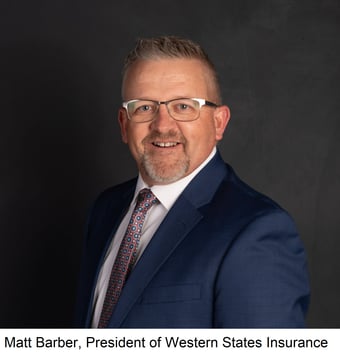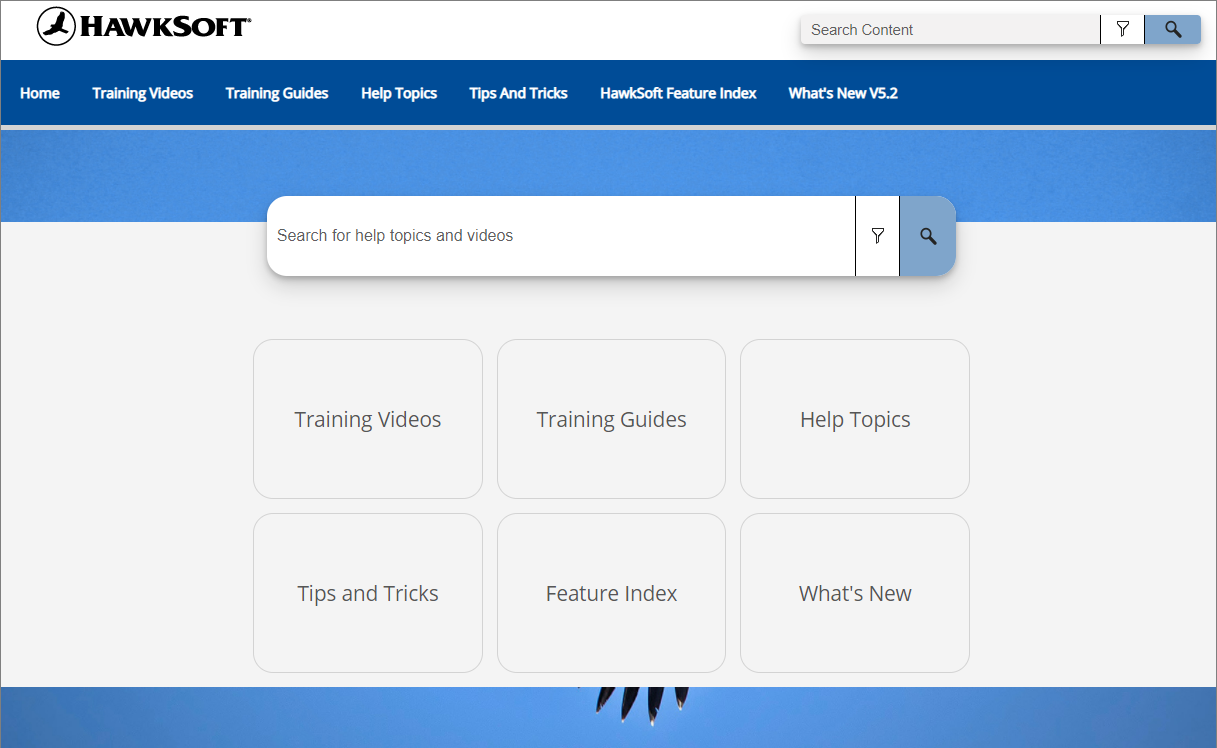Big I’s list of Best Practices Agencies recognizes those independent agencies who “represent the highest performers based on their growth and operational excellence.” The 2021 list included 264 agencies from 45 states who submitted financial and operational data for review after being nominated. We want to congratulate all the HawkSoft agencies that were recognized as Best Practices agencies!
We caught up with HawkSoft customer Matt Barber, president of Western States Insurance in Spanish Fork Utah, whose agency has been on the Best Practices list for over 12 years. We asked what sets his agency apart and what he recommends for agencies looking to achieve similar growth.
In this article:
- Meet Western States Insurance
- Following the numbers: clean data & analytics
- Going above & beyond with claims service
Meet Western States Insurance
Matt is a third generation insurance agent: his grandfather started the agency 46 years ago, and about 14 years ago Matt continued the family legacy by taking over ownership from his father. “The agency allowed me to do the things I really love to do,” Matt says, “like spending time with my family and coaching my kids in their activities. That’s why I started working there. But as I grew into the business, I found I love the whole entrepreneurial spirit that lies in being an independent agent. That’s why I’ve stayed.” Matt has now been at the agency for over 30 years.

While Matt considers the agency to be generalists, about 65% of their book is commercial and they specialize in several areas, including auto body and tire shops, gas stations and convenience stores, and contractors. “We can write anything that comes in the door,” he says. “We just had a crypto miner, for example. We’re the preferred provider of an auto dealer association. We do special events like the Tough Mudder and lantern festivals. We get creative and find carriers that we can build programs with.”
Western States Insurance was first nominated for the Big I Best Practices list 13 years ago, only a year after Matt had become owner of the agency. He explains he asked a carrier to nominate them at the time, because as a new owner he wanted to track his agency’s numbers. “I wanted to do it because I needed some help on how to know what metrics to use to be most successful,” he says. “I wanted to find out what my baseline numbers were and how they stacked up against the best agencies in the country.” After making the Best Practices list originally, the agency’s data was re-evaluated every 3 years in order to renew its status.
When asked what he attributes to his agency’s impressive run on the Best Practices list for over a decade, Matt points to his agency’s focus on clean data and their commitment to superior claims service.
Following the numbers: clean data & analytics
Keep an eye on EBITDA
Matt observes that becoming a Big I Best Practices agency while he was still a new agency owner had a huge impact on his approach to business. “It’s all very data-driven,” he says of the requirements to become a Best Practices agency. “It takes hours to set up and track all the data. But it has really changed the way we do stuff here in our agency. I can look at the numbers and evaluate things.” He says the most important number his agency monitors is EBITDA, which stands for earnings before interest, taxes, depreciation, and amortization. A standard measure for net revenue, EBITDA is what most acquirers base agency value on.
“I would recommend any and every agency start tracking their EBITDA as your baseline,” Matt says. “Whether you want to sell your business or not, tracking your EBITDA figures is key. And that requires you to keep your data absolutely, perfectly clean.” He points out that it’s especially important for commission tracking to be as accurate as possible: “Commission is where the majority of the revenue comes from, so you have to make sure you're tracking it accurately and treating it just like a bank account, where you reconcile every month to the penny so that you know exactly where your revenue is.”
What is EBITDA and why should your agency track it?
Clean data & Agency Intelligence
Matt uses HawkSoft’s Agency Intelligence reporting suite and other reporting features to track important key performance indicators (KPIs) for his agency. “Agency Intelligence pulls data from every client interaction,” he says. “It breaks things down to your productivity and revenue generated per employee, which is really a key indicator as to how well you're doing: how well you’re compensating your people, how good your processes are, how efficient your operation is, and areas where you can improve. Agency Intelligence puts it all in one place.”
However, he warns that it can be tricky to get your data clean enough to report on accurately. “There are just so many data points in HawkSoft,” he says, “but if you want your Agency Intelligence to be accurate, all the data points have to be accurate.” Standard processes need to be put in place to ensure that everyone at the agency inputs and updates policies the same way. Western States has put years of effort into cleaning up and standardizing the agency’s decades-worth of data, and even has a data analyst on staff to monitor data entry and analysis. The process has illustrated the importance of starting with clear processes and clean data from the start. “It’s easier to set up data tracking and good processes from the start,” Matt notes. “It’s not as easy to clean up what you already have.”
"If you want your Agency Intelligence to be accurate, all the data points have to be accurate... Figure out what you need to track from the start and how to use all the functions [in HawkSoft], including the accounting and commission tracking, so that everything is being tracked correctly from the beginning."
Matt’s advice for new agencies? “I would tell a new agent to start out with HawkSoft,” he says, “because it’s robust enough to do everything they need to do, and it’s affordable, and the setup process is very simple. Figure out what you need to track from the start and how to use all the functions, including the accounting and commission tracking, so that everything is being tracked correctly from the beginning.”
Going above & beyond with claims service
Another area where Matt feels the agency differentiates itself from the rest of the field is the claims process. “One of the focuses our agency has always had is that we sell claims,” he says. “We have dedicated claims people in our office, and we never send our customers to 1-800 numbers.” He observes that excellent claims service presents a challenge, as carriers don't always involve agents in the claims process, but the agent plays a part that’s beneficial for both the carrier and the client. He explains, “we've proven to the carriers that we are helping them do their job because ultimately the client is both of our customers, and at the end of the day the client feels like the claims are what they’re paying their premiums for, so we really make sure to take care of them there.”
Matt believes the key to a good claims experience for a client lies in frequent and open communication. His agency strives to establish contact with the client within 24 hours of submitting the claim. “We have an internal process that keeps everybody in the loop and communicating with each other,” he says. “We’ve found that if we can manage expectations up front, it greatly minimizes the risk of people being upset.”
See how Western States Insurance sets itself apart through claims service
The agency also focuses on providing a good experience for the other party during the claim. “In an auto claim,” he says as an example, “we really go overboard to take care of the other party as well. A lot of the time they’ll realize, hey, my agent doesn't do that for me! So we get a ton of referrals from people who have claims with our clients.”
"In an auto claim, we really go overboard to take care of the other party as well. A lot of the time they’ll realize, gee, my agent doesn't do that for me! So we get a ton of referrals from people who have claims with our clients."
He points out that technology plays a vital part in quickly servicing policies and communicating with clients. His agency employs tools like an eSignature tool and HawkSoft Text Messaging to speed up the claims process, and he emphasizes the importance of having a management system that maximizes efficiency. “HawkSoft does everything that we need to do: the certificates of insurance, the ID cards, the logging and tagging in the client files, the bridging with the carriers, the streamlining of the application process, and all the marketing and API options that are available. It just makes everything much more efficient. And over the years, we've actually grown and we do more business with less people because of the efficiency inside the system.”
Growth never ends
Although insurance has always been part of Matt’s life, he sees the industry as containing endless opportunities for improvement. “There are so many ways to get better and grow,” he says. “And every day is something different. I’ve been doing this for 30 years and I’ve still got plenty of years left, and I’m excited for the future.” Whether it’s zeroing in on data or upping the ante on service, there’s always something new your agency can focus on to achieve new levels of growth.
Need tips on cleaning up your data in HawkSoft?Check out these resources from HawkSoft and the HawkSoft User Group (HUG) on cleaning up your HawkSoft data to ensure accurate reporting and analytics.
|






